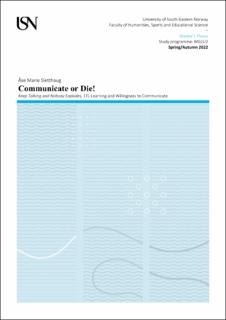| dc.description.abstract | The willingness to communicate (WTC) of young learners is influenced by several factors, such as situational factors, motivation, lack of confidence, and anxiety. Numerous researchers have examined possible theories and educational approaches to encourage learners to become more confident and talkative in the English as a foreign language (EFL) classrooms. The theories have suggested language teaching techniques that motivates, encourages, and could reduce the anxiety of the learners, which in turn could make them actively participate in the task at hand. The thesis accounts for several EFL learning theories but mainly focuses on the communicative language approach and game-based learning. The main objective of this thesis is to investigate the video game Keep Talking and Nobody Explodes’s (KTaNE) effect on Norwegian EFL learners’ willingness to communicate. In short, KTaNE is a hectic puzzle game where players must cooperate in order to defuse a ticking time bomb. The game relies upon constant verbal communication between the designated ‘defuser’, the only one who can see and interact with the bomb, and the bomb expert(s), the only one(s) with access to the manual. The game requires players to keep talking, thus, it could potentially encourage communication and participation, by lowering affective filters. Three qualitative group interviews were conducted with three EFL learners (N=9 age 15- 16) in each group, nine participants in total. The participants first played KTaNE and then answered questions about their experience and whether video games can influence their use of English, primarily speaking skills, but also reading and listening. The findings indicate that the students spoke more when playing the game compared to a regular EFL class, and the research established that they were more comfortable speaking English in the less threatening and fun environment created by the game. | |
